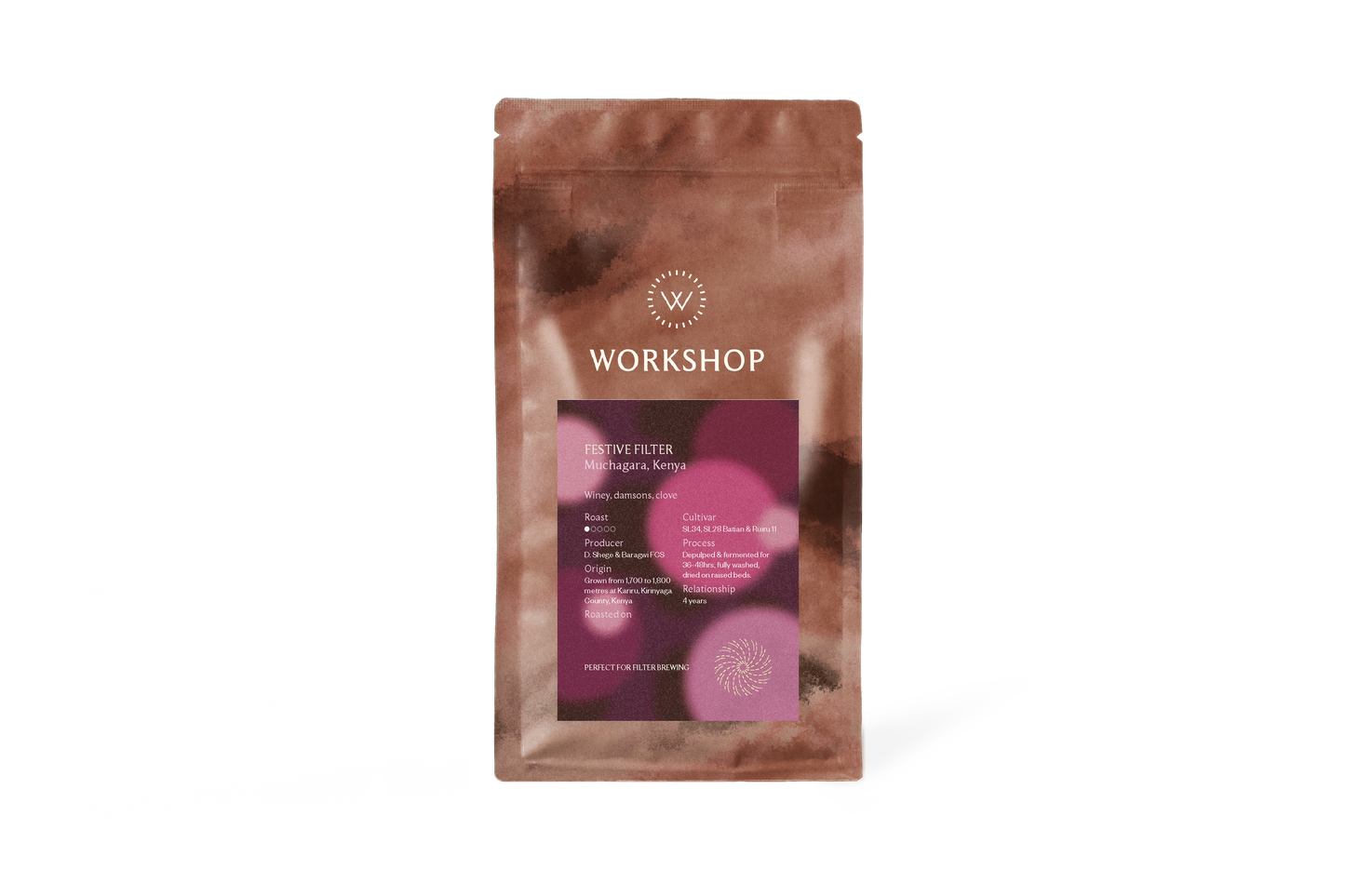
Muchagara Festive Filter
Muchagara Festive Filter
Festive, winey profile with bright damson and warming spice notes of clove and nutmeg.
Couldn't load pickup availability

- Our whole bean coffee is nitrogen flushed to prolong freshness.
- 250g bags made from post-consumer recycled plastic.
Product information
Product information

It is our fourth year working with coffee produced at the Muchagara coffee factory in Kenya’s Kirinyaga region. We have selected this particular lot as a festive release given its piquant, winey profile, with clear notes of damsons and hints of warming spices like clove and nutmeg.
The Farmers:
Between 1,500 and 1,700 smallholders grow, harvest and deliver their coffee cherries to the Muchagara factory to be processed. They live in the surrounding area in Kariru, and whilst a range of coffee varieties are being grown the overwhelming majority at 90% is SL34. There are pockets of SL28 as well as more recently introduced, rust-resistant varieties like Ruiru 11 and Batian.
The agricultural conditions for growing coffee are particularly good, being located between 1,700 and 1,800m on the volcanic, southern slopes of Mount Kenya in Kirinyaga County. Coffee cherries take a long time to slowly mature and ripen, and this particular selection we’ve bought comes from the peak of the harvest, when cherries are in their prime. This contributes to more sweetness and complexity in the cup.
Most of the smallholder farmers delivering coffee cherries have between 200 and 500 coffee trees, provided under the Baragwi FCS with Rainforest Alliance and 4C certificates. The collected fruit is sorted on tarps before processing, to refine the quality by removing under and over ripe cherries, and then pooled together at the mill.
The Washing Station:
Established in 1959, Muchagara was the first coffee processing factory in Kenya’s Kirinyaga County. Whilst the mill itself is the oldest in Kirinyaga, the manager David Shege has been running operations for the last seven years. His primary goals are to renovate and improve the factory’s infrastructure in order to increase the quality of their coffee. They are typically producing up to 200 tonnes of coffee per year, which puts a strain on everything from their depulping equipment, fermentation tanks and drying beds. After depulping the coffee is fermented in tiled tanks for between 36 and 48 hours, before being fully washed and soaked in clean water from the river. Once the parchment is squeaky clean and homogenised it is dried on raised beds in the sun for between 10 and 15 days.
Established in 1953, the Baragwi Farmers’ Co-operative Society oversees not just the operations at Muchagara, but at 11 other factories, which are Kariru, Thimu, Karumandi, Kagongo, Guama, Kianjiru, Kianyaga, Kyanja, Gachami, Githiururi and Rwambiti. They have 16,892 registered members supplying these 12 factories with coffee cherries as well as 137 staff employed to carry out logistics and run the washing stations.
As well as investing in producing high grade, specialty coffee the membership of the Baragwi FCS adhere to strong ethics which shape their methods of production. Amongst the 10 of their admirable guiding principles are a commitment to conserve the natural ecosystem, as well as aiding ecological restoration in critical areas and providing a refuge for native wildlife on their farms. They also focus on conservation of soil and water resources at the farm and factory level, using organic matter to enrich the soil as well as preventing erosion and minimising the use of chemical products through informed intercropping.
Brew Recipe
Brew Recipe
Filter Brewing
Brew Ratio: 60g/L
Water Temperature: 100°C
Grind: Medium-fine
Pourover Recipe
Dose: 18g
Brew Water: 300g
Grind Size: Similar to caster sugar
Bloom: 50g water for 30 seconds
Pours: 50g every 30 seconds
Brew Time: Final pour at 3:00, total drawdown by 3:30


Coffee composition
Place
Kariru, Kirinyaga County, Kenya
Palate
Winey, damsons, clove
Producer
David Shege & Baragwi FCS smallholders
Current composition
SL34, SL28 Batian & Ruiru 11 depulped & fermented for 36-48hrs, fully washed & soaked, dried on raised beds.
